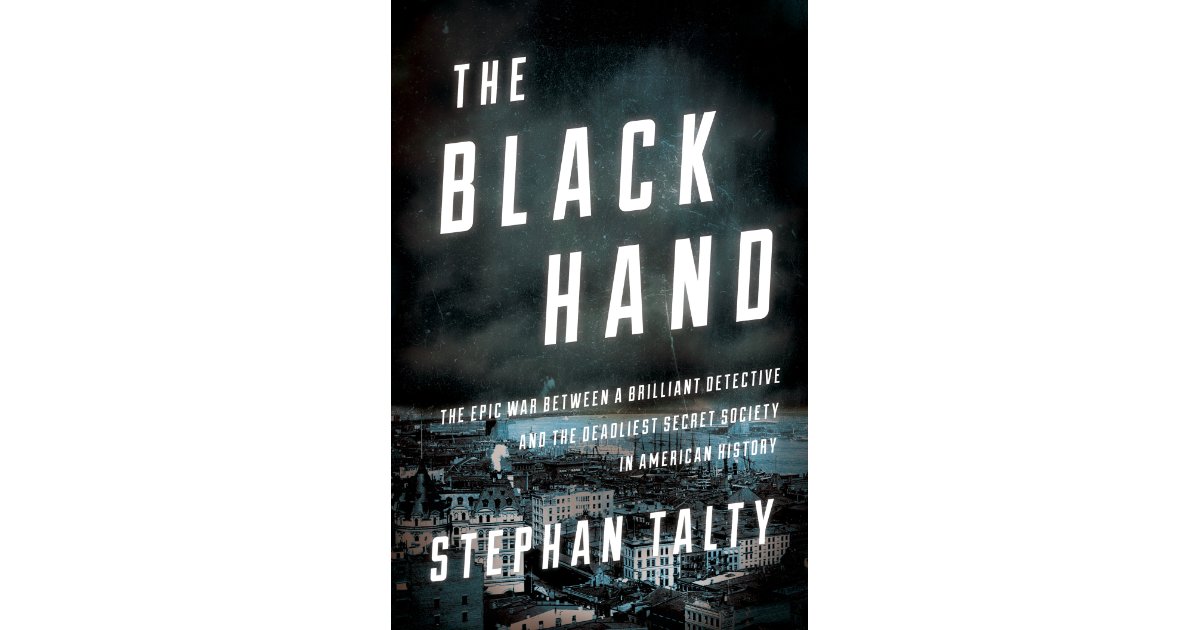
16 Nov It’s man vs. the mob in Stephan Talty’s exhilarating history ‘The Black Hand’

 “The Black Hand: The Epic War Between a Brilliant Detective and the Deadliest Secret Society in American History,” by Stephan Talty (HMH)
“The Black Hand: The Epic War Between a Brilliant Detective and the Deadliest Secret Society in American History,” by Stephan Talty (HMH)
The Petrosinos had immigrated in 1873, when Joseph was 13. To help support his family, he left school after sixth grade to work full time as a shoeshine boy, earning about a quarter a day. At age 17 or 18, he was hired as a city street cleaner. Thanks to his work ethic, his obvious talent and the intercession of a mentor, he advanced to commander of a scow that dumped municipal garbage in the Atlantic Ocean. In 1883, despite being only 5 feet 3 inches tall, he was recruited by the police force of what already qualified as “the largest Italian city in the world.”
One of Petrosino’s motives in going after the Black Hand was a fear that authorities might eventually crack down on immigration from Italy. Yet he also sought to distance himself from his countrymen. In an almost unheard-of break with Old World tradition, Petrosino remained single and lived alone in a non-Italian part of town. (He finally married at age 47.) His superb memory for faces and his dogged pursuit of leads won him a promotion to detective, leadership of a small unit of Italian cops, and the nickname “the Italian Sherlock Holmes.” One of his star turns came when the Hand tried to extort $5,000 from the great Italian tenor Enrico Caruso. Impersonating Caruso, Petrosino kept the rendezvous and overpowered and arrested the extortionists. (One wonders if they could have blown “Caruso’s” cover by demanding a song.)
Despite his success, however, Petrosino faced discrimination within the NYPD just as his countrymen did outside it, and his operation remained woefully understaffed as the Black Hand expanded into other cities and states. All that changed, however, when a man without ties to the political machine known as Tammany Hall was appointed commissioner of police. This was Theodore Bingham, an ex-military engineer who may have sucked even more oxygen out of rooms than a dynamic predecessor in the police commissioner’s job, Theodore Roosevelt. At the heart of “The Black Hand” is Talty’s account of how Bingham was both the best and worst of bosses, making a favorite of Petrosino, giving him the support he needed, but foolishly sending him on an intelligence-gathering trip to Italy, where, thanks to Petrosino, so many Black Hand members were now living in sullen exile.
 (Pictured to the Right, The author Stephan Talty (Natacha Vilceus/Natacha Vilceus))
(Pictured to the Right, The author Stephan Talty (Natacha Vilceus/Natacha Vilceus))
Talty, himself the son of Irish immigrants, tells his story with flair. In addition to Caruso’s cameo, there is one by the young Al Capone, a Hand member who fled New York when things got too hot there and ended up at “the site of his future empire” — Chicago. Talty also gives us a peek at the leave-nothing-to-chance ethos of Tammany Hall. “It was said that [boss Big Tim Sullivan] perfumed the ballots on election day so that he could make sure his constituents had actually voted by sniffing out the scent on their hands.” And the Black Hand knew it had arrived when, in 1905, a newspaper serial featuring the famous lawman Bat Masterson kicked off with him “On the Trail of the Black Hand.”
I only wish the author had provided more detail on how the Black Hand was finally stopped. Once Petrosino is out of the picture, Talty seems to lose interest, covering the gang’s decline and fall in a mere three-and-a-half pages. On the whole, though, this is a valuable recounting of a lurid and little-known episode in American history.
Dennis Drabelle is a former mysteries editor of Book World.
 Call us at: Tel. 917-544-2202
Call us at: Tel. 917-544-2202



